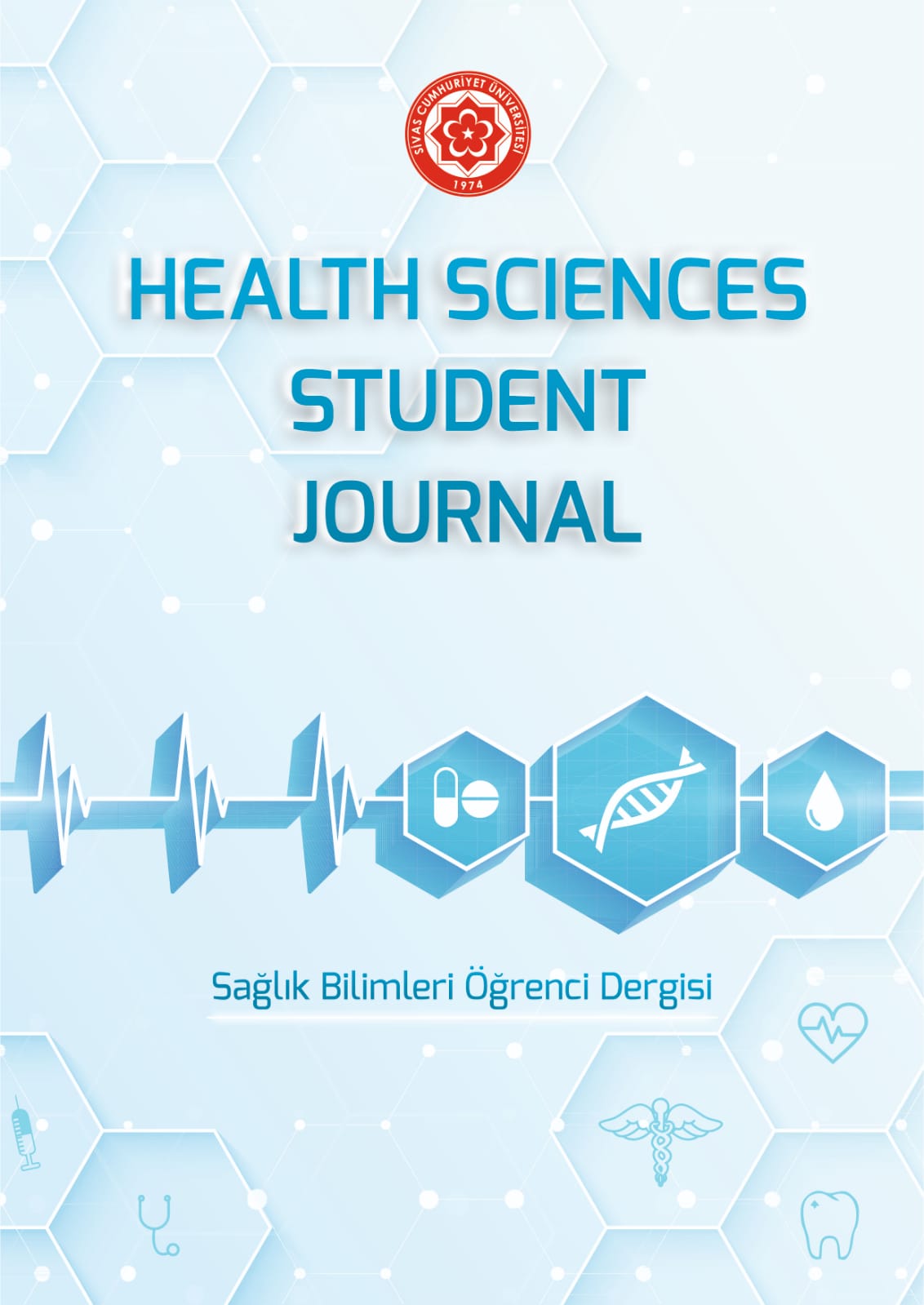![]()
Evaluation of Medical Faculty Students’ Knowledge About Hypertension
Yazarlar: Kübranur DEMİR1, Kübra ALBAYRAK1, Çağrı MARAŞLI1, Serkan ÇELİKGÜN2, Anıl ŞAHİN3
Corresponding author
1Kübra ALBAYRAK, Sivas Cumhuriyet Üniversitesi Tıp Fakültesi, Dönem 5, Sivas, Türkiye
E-mail: dralbayrakkubra@gmail.com
Other authors
2Sivas Cumhuriyet Üniversitesi Tıp Fakültesi, Patoloji Anabilim Dalı, Sivas, Türkiye
3Sivas Cumhuriyet Üniversitesi Tıp Fakültesi, Kardiyoloji Anabilim Dalı, Sivas, Türkiye
ÖZET
Hipertansiyon insidansı bütün yaş gruplarında gün geçtikçe artmaktadır. Artışla beraber yaşanan olumsuz durumlarla mücadele için sorunun farkında olan doktorlar yetişmelidir. Geleceğin sağlık profesyonelleri olarak genç tıp fakültesi öğrencilerinin hipertansiyon farkındalığı ve bilgi düzeylerinin yüksekliği önem taşımaktadır. Çalışmamızın amacı tıp fakültesi öğrencilerinin farkındalıklarını ve bilgi düzeylerini ölçmektir.
Çalışmamız Sivas Cumhuriyet Üniversitesi Tıp Fakültesi’nde eğitim görmekte olan 1527 öğrencinin tamamının ankete davet edilmesi ile yapılmıştır. Öğrencilerden yalnızca 105 tanesi ankete katılmayı kabul etmiştir. Anket 5 bölümden oluşmakta olup genel bilgilerden fizik muayeneye dek çeşitli sorular sorulmuştur.
Elde edilen sonuçlar, tıp fakültesi öğrencileri arasında hipertansiyon konusunda genel olarak yeterli bir bilgi düzeyi olduğunu göstermektedir. Bununla birlikte, öğrencilerin bazı spesifik alanlarda eksik bilgilere sahip oldukları ve bu konuda daha fazla eğitime ihtiyaç duydukları ortaya çıkmıştır. Örneğin, kan basıncı ölçümünde manşon kullanımı, aritmi varlığında kan basıncı ölçüm yöntemi gibi konularda bilgi düzeyleri daha düşük bulunmuştur. Bu verilerin incelenmesiyle, öğrencilerin hipertansiyon ve ilgili konularda bilgi düzeylerinin dönemler ilerledikçe arttığı görülmektedir.
Tıp fakültesi öğrencilerinin hipertansiyon konusunda bilgi düzeylerinin daha da artırılmasına yönelik planlamalara ihtiyaç olduğu görülmüştür.
Anahtar Kelimeler: Farkındalık, Hipertansiyon, Tıp Fakültesi.
*Bu çalışmanın özeti 13. Uluslararası İstanbul Bilimsel Araştırmalar Kongresine sözlü sunum olarak sunulmuştur.
ABSTRACT
The incidence of hypertension is increasing day by day in all age groups. In order to combat the negative situations experienced with the increase, doctors who are aware of the problem should catch up. As the health professionals of the future, it is important to raise the awareness of hypertension and knowledge levels of young medical school students. The aim of our study is to measure the awareness and knowledge levels of medical school students.
Our study was conducted by inviting all 1527 students studying at Sivas Cumhuriyet University Faculty of Medicine to the survey. Only 105 of the students agreed to participate in the survey. The questionnaire consists of 5 sections and various questions were asked from general information to physical examination.
The results obtained show that there is a generally sufficient level of knowledge about hypertension among medical school students. Dec. However, it turned out that students have incomplete knowledge in some specific areas and need more education on this issue. For example, the level of knowledge on subjects such as the use of cuffs in blood pressure measurement, the method of measuring blood pressure in the presence of arrhythmia was found to be lower. By examining these data, it is seen that the level of knowledge of students about hypertension and related subjects increases as the semesters progress.
Keywords: Awareness, Hypertension, Medical School.
*The summary of this study was presented to the 13th International İstanbul Scientific Research Congress as an oral presentation.
How to Cite (APA 7)
Demir, K., Albayrak K., Maraşlı Ç., Çelikgün S., Şahin A. (2023). Tıp Fakültesi Öğrencilerinin Hipertansiyon Hakkındaki Bilgilerinin Değerlendirilmesi. Health Sciences Student Journal, 3(1), 1-7. https://www.healthssj.com/tip-fakultesi-ogrencilerinin-hipertansiyon-hakkindaki-bilgilerinin-degerlendirilmesi/
KAYNAKLAR
1. Hypertension. (n.d.). Retrieved April 11, 2023, from https://www.who.int/news-room/fact-sheets/detail/hypertension
2. Kleinrok, A., Kaminski, M., Domanski, T., & Prokop-Lewicka, G. (2017). Correct and incorrect knowledge of the risk factors concerning the development of arterial hypertension. Part 2. Population of patients with identified arterial hypertension. Arterial Hypertension, 21(2), 83–92.
3. Sobierajski, T., Surma, S., Romańczyk, M., Łabuzek, K., Filipiak, K. J., & Oparil, S. (2022). What Is or What Is Not a Risk Factor for Arterial Hypertension? Not Hamlet, but Medical Students Answer That Question. International Journal of Environmental Research and Public Health 2022, Vol. 19, Page 8206, 19(13), 8206. https://doi.org/10.3390/IJERPH19138206
4. Beaney, T., Schutte, A. E., Stergiou, G. S., Borghi, C., Burger, D., Charchar, F., Cro, S., Diaz, A., Damasceno, A., Espeche, W., Jose, A. P., Khan, N., Kokubo, Y., Maheshwari, A., Marin, M. J., More, A., Neupane, D., Nilsson, P., Patil, M., … Poulter, N. R. (2020). The Global Blood Pressure Screening Campaign of the International Society of Hypertension. Hypertension, 76(2), 333–341. https://doi.org/10.1161/HYPERTENSIONAHA.120.14874
5. Whelton PK, Carey RM, Aronow WS, et al. 2017 ACC/AHA/AAPA/ABC/ACPM/AGS/APhA/ASH/ASPC/NMA/PCNA Guideline for the Prevention, Detection, Evaluation, and Management of High Blood Pressure in Adults: A Report of the American College of Cardiology/American Heart Association Task Force on Clinical Practice Guidelines. Hypertension. 2018;71(6):e13-e115. https://doi.org/10.1161/HYP.0000000000000065
6. Xu, W., Goldberg, S. I., Shubina, M., & Turchin, A. (2015). Optimal systolic blood pressure target, time to intensification, and time to follow-up in treatment of hypertension: population based retrospective cohort study. bmj, 350.
